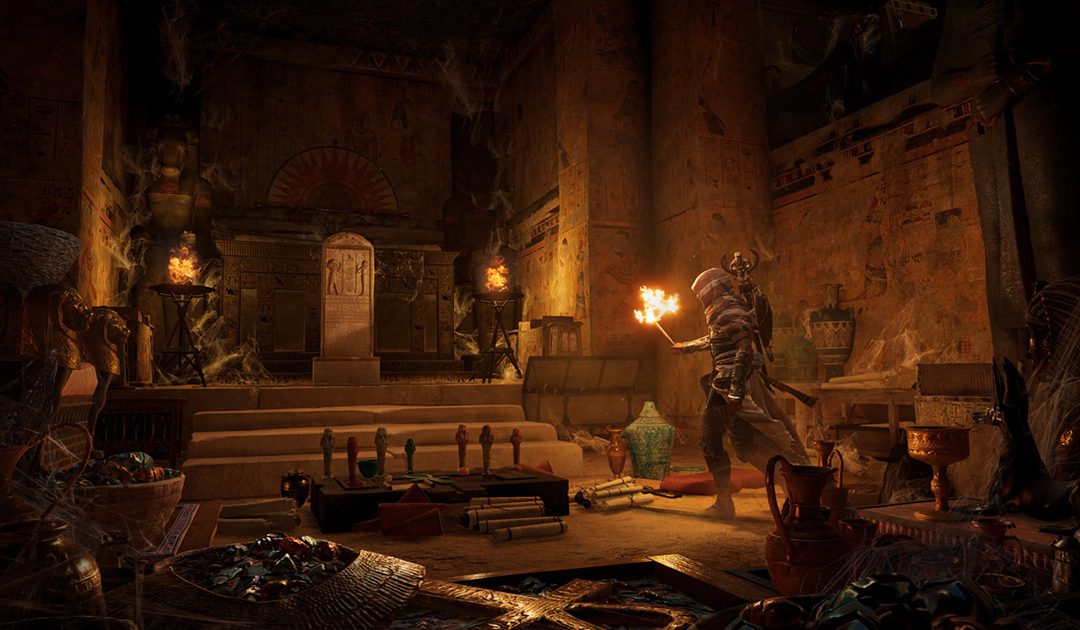Assassin's Creed: A Storyteller's Redemption

From Altair to Bayek, AC Origins is a homerun when the franchise needed it the most.
I’ve been avid AC player for over a decade—I’ve played all major releases as they came out since its inception. I’ve even read a few of the books, watched the cinematic shorts, and went to the theater to see the movie. I love the story and idea that is Assassin’s Creed.
However, in recent years, the game has strayed drastically from its compelling roots and existential undertones–which was the entire reason I forced myself to play through the clunky hair-pulling controls and egregious repetitiveness that was Altair in the first couple installments. Originally, the story was so good that I was willing to suffer through its god-awful playability. However, as the playability got better, the story became much worse.
By the time Ezio rolled around, Ubisoft realized it had a special franchise on its hands. Recreating historical places and events, of the like which couldn’t be captured in such a way by any other medium, was a resounding success. To me, Assassin’s Creed marks the beginning of true historical simulations—a new human ability to share history in such a way that the event effectively becomes a personal experience, rather than a passive understanding.
Granted, this experience is only as good as its creator. How truthful the historian and developer is will always be subjective—but all being equal, so are the books you read. In the beginning of the AC franchise, these historic worlds were created purely for entertainment—but the critical part that the sold the idea of Assassin’s Creed and this type of entertainment was its realism and historical accuracy. The game hinges on blending fact and fiction, and historical truth is central to the development of the story.
The creation the developers came up with, these masterful and beautiful open worlds sprinkled across human history, turns out to be the closest thing we have to time travel. As our technology progresses, immersive virtual reality will allow you wander around great moments of the past, in a sense experiencing them for yourself. In fact, with Origins, that is already happening—the new game features Discovery Tour Mode that disables combat and missions, allowing you simply walk around ancient Egypt and take it in.
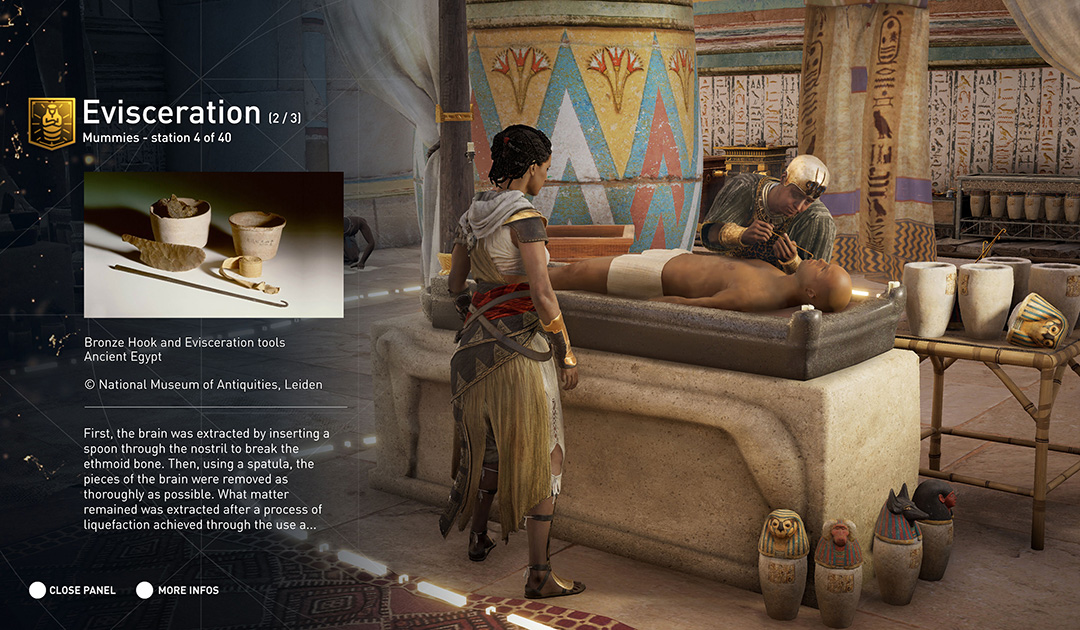
This is an incredible prospect—big AAA video games are now bastions of credible experience—these virtual tours containing historically accurate architecture, interactive representations of the people and their ways of life, and tons of popups containing learning opportunities and historical facts. Origins’ representation of ancient Egypt is so good that this “discovery mode” is being used in schools and museums as educational tools and virtual experiences. People are learning about the pyramids and Sphinx via a simulated experience of them—this immersion creating a profound connection with Egypt, rendering the encounter to be more effective than consuming a traditional book, documentary, or lecture because the encouter becomes personal. And no, this is not like how you and I learned about the dysentery on the Oregon Trail.
Ubisoft’s realization of what historical intellectual property could mean big picture, and the gamer goldmine the AC franchise became, turned out to be a double-edged hidden blade for those of us who actually cared about the story that started it all. On one hand the game actually became fun to play, but in turn all of the attention, development, money, and mass-audience-pleasing focus grouping robbed it of its controversial teeth. If you can bear the controls, go back and play those first couple of games with Altair—wow! I’m still surprised that a large publisher took the chances they did, or even considered investing in a game that directly confronted race, religion, ethics, and condemned popular values. Through a fictionalized story, a video game attempted to provide an answer of what it means to be human; where we came from and where we’re going—all while brutally jettisoning those pulling the strings from behind the scenes. The Italian Renaissance games of Ezio softened this position and by the time the American Colonial Era games rolled around, all of the original story’s esoteric and occult pinnings had been whitewashed. The eery ancient prophesies chased by the Templars and Assassins had become a deeply buried novelty instead of its backbone.
Likewise, Unity and Syndicate were immersive because of the historical experience these periods created—the French Revolution and steampunk England—but these games contained nothing of substance and were a huge storytelling disappointment compared to the original concept. The franchise had turned into just run around and slaughter for no reason in this really cool environment. This was immensely frustrating for those of us who had been playing since the beginning.
The overarching plot of the franchise contains so many loose ends, dead ends, and holes; then the most recent games leading up to Origins didn’t even acknowledge the events that had shaped them or bring into focus the stakes and consequences of what the series had been about. The underlying plot which was so good during the Third Crusade—the reason I fell in love with the series—had been gutted due to fear of a controversial backlash, uncertainty of how to redirect the franchise in more politically correct fashion while still making sense of what they had already created, and underestimating the intelligence of the user.
You have to remember, Twitter and YouTube weren’t really things when the franchise originally released—and they certainly weren’t when it began development. Sure, there were lots of online forums, but there was no such thing as overnight societal outrage spawned by social media pitchforks. In order to know what was going on within the game, you actually had to be a part of that community or play it—instead of just seeing a dumb out of context comment in your feed that was immediately being shared by an ocean of ideological zealots.
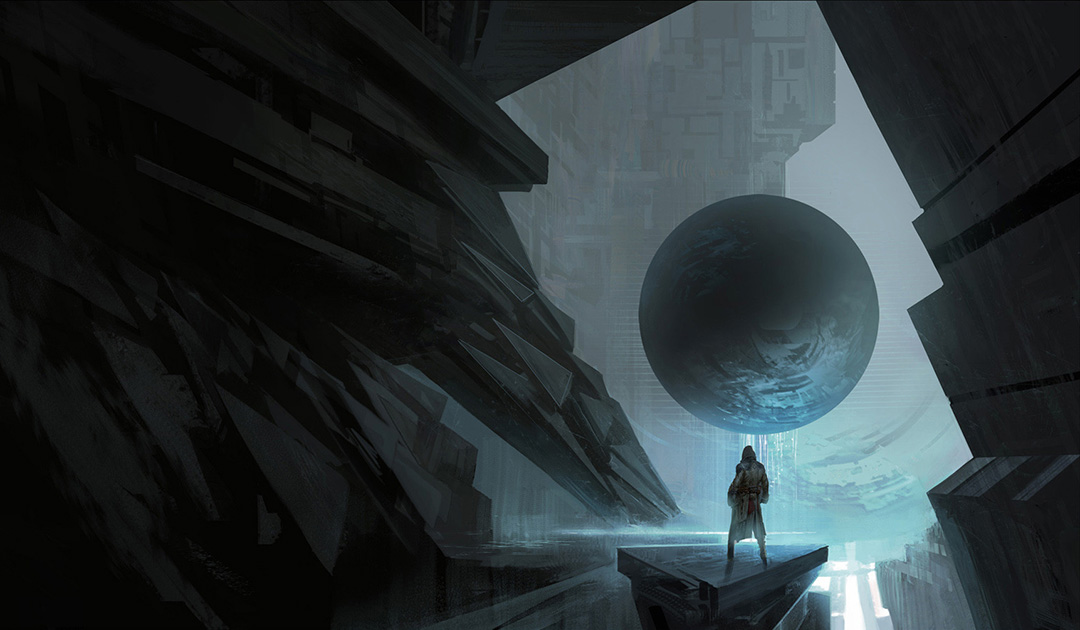
It’s dangerous, and an unwise business decision, to be anything other than appeasing in our current polarized and self-imposed watchdog culture. Ubisoft took a lesson straight from its own AC prophesies—perception is reality. No one cared about staying true to the story or creating greatness, only that the game sold well. Walking a tightrope between sloshing out some sort of “reason” to keep the plot going, and pumping game out year after year to cash in on the holiday bloodlust of its now sociopathic tendencies gave rise to its own mediocrity; otherwise known as Unity and Syndicate.
I was so disappointed with Syndicate that by the end I was prepared to abandon the franchise all together. Yes, it was visually stunning and it was fun to play—but it was jingling keys and cotton candy in lieu of depth, insight, and risk that had been foreshadowed. The table has been set since Desmond’s near-apocalyptic-miss in 2012; since we have been floundering with obscure Sages and no real consequences of his actions or why we continue to need to revisit the memories of the past. The First Civilization and now Juno’s return is what the game is about, yet these plot lines are so buried and little development is given to them that the casual player wouldn’t even know what I’m talking about.
The year off between Syndicate and Origins allowed me to forgive AC, or at least get excited about running around ancient Egypt, but I had to accepted that at this point the story I loved has long been forgotten. Even if the First Civilization was resurrected, it could never be handled in such a critical, compelling, and thought provoking way that it had in the Altair games. Now Ubisoft plays it safe to ensure broad appeal, in doing so they’ve lost the ability of generating any meaningful beliefs, desires, and emotions in the person experiencing their story. It’s a shame because these games are experiences—a connection, but now without any intent other than to get my money each year. I have to believe that the original writers had something to say—it’s shame that we’ll never get to experience that.
With that said, and even with the name being “Origins”, I was pleasantly surprised to see that the story’s roots weren’t completely abandoned. The eery messages of the First Civilization were back, we were once again tracking down the glowing and mysterious artifacts that they left behind, and while it’s message was a less controversial than what the original game had prophesied—Origins did give nuggets of real philosophy that made me happy.
While the story of the First Civilization predates Christianity, I think it was shrewd side-step by the developers to place Origins pre-Christian, about 60 years prior. This ties things close enough to the original Altair story, but also absolves a lot of the controversy surrounding the first game and places the religious focus on less-heated mythology of Egyptian, Greek, and Roman Gods. I have a feeling we’ll see more from Bayek and Aya in the future, possibly confronting or paralleling the beginning of Christianity—but in doing so, Christianity is now a byproduct or consequence of a larger narrative, rather than the facilitator of the Assassin Brotherhood resistance.
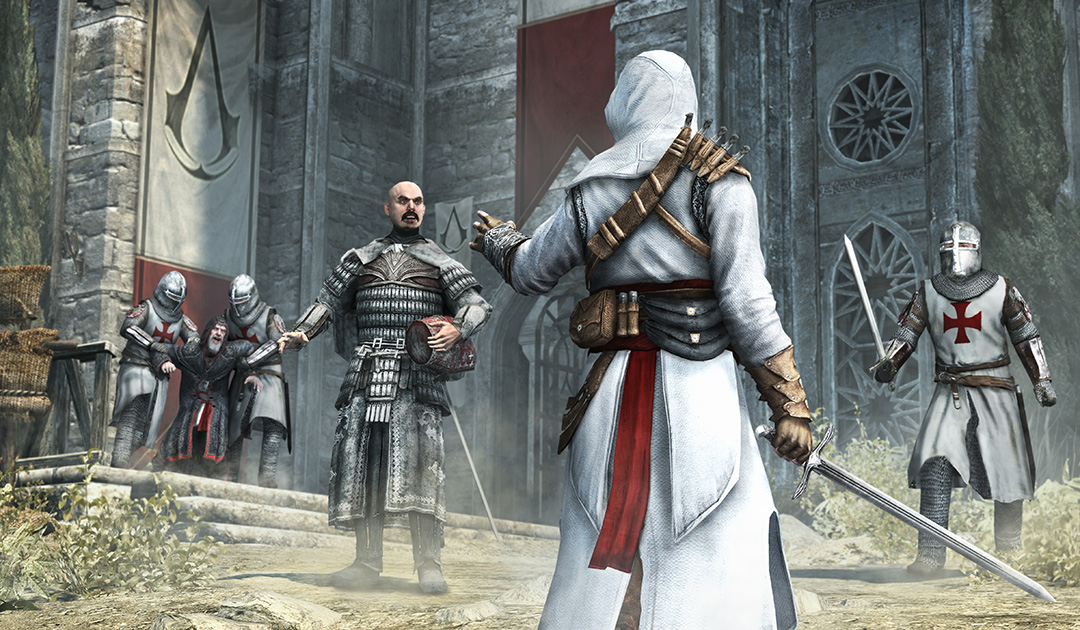
We must remember that the whole Assassin’s Creed story started as a fight against the Knights Templar—historically, a Christian military faction that ravaged the middle east (or fought gallantly, depending on your position…) during the First Crusade. The Templars were eventually “disbanded” by the Church, but historians and conspiracy theorist alike love the fact that the group was driven underground and became a “secret order”. The Knights Templar are now a branch of the Freemasons and many believe they are the secret society’s founders.
According to the game, it was the “assassin’s creed” to kill all Templars and end their reign of oppression. Obviously in the first game, this had huge Christian implications. Basically it portrayed the Roman Catholic Church as a giant power-hungry cult that would stop at nothing to achieve world domination—the game quickly rebranding this message as its popularity grew, and the Freemasons of the modern age were replaced by Abstergo—an insanely powerful multi-national corporation with their fingers in everything (not unlike the Freemasons). With each new game, the story took larger and larger steps away from the occult and Catholic and Masonic controversies, to the point where these original plot lines are no longer even being referenced.
Origins somewhat addresses this, and may now have finally found a way to relieve itself of the world-dominating Catholic plot burden, but still continue with its First Civilization storyline. We now know that the fight between the Assassins and the Templars predated Christianity. It appears the Templars (simply called The Order at this point) originated under Julius Caesar after the discovery of some ancient and mysterious artifacts that gives anyone who wields them god-like powers. The Assassins, in turn, fight to balance the oppression that these powerful objects create by those who abuse them. The Assassins aren’t really fighting Christians, and these artifacts are not necessarily Christian in nature (though in previous games they sure made it seem that way—Shroud of Turin, the Pope’s Staff, etc.) but rather they’re fighting Templar corruption that “just happened” to infiltrate the Roman Catholic Church and used the guise of religion in an effort to gain their own world domination and promote Juno’s prophesied order and control. The Templars intertwined the power of the First Civilization artifacts with Christianity to give credence to the religion and ensure blind and unwavering submittal by the masses to keep them under their control—religion acting as a mental form of slavery. It’s clunky and unsatisfying, but it works.
Obviously the fight between slavery (aka order) and freewill is much larger than Assassins and Templars. The story has always been designed to transcend culture, religion, or period of time—that was the beauty of it. However, the first games placed so much of its focus on the conspiracy of the Templars and then we never received resolution—then it was just ignored altogether. Now AC can take the position that none of Templar storyline really mattered—it was just a chapter in a much larger narrative, simply there to introduce you to the ongoing fight, these mysterious artifacts, and then begin to unraveling the cryptic nature of the First Civilization. The position will be that the Templars are rather insignificant in big picture, the same as the Assassins—no matter what you call them, it’s a never ending fight over philosophy that began when the First Civilization created humanity.
If that’s the case, I’m a bit sad because the “Dan Brown-like” Masonic / Templar story is what I fell in love with. It gave a real conspiracy-theory-type-of-feel to the game—that everything we know has been a lie and there’s a few out there with the truth, and you’re a “chosen one” allowed to uncover it as you play. The game took on big philosophical issues and spun knowledge with creepy occult ritual, leading you to question if maybe that’s how the world “really” is. While The Da Vinci Code was a massive blockbuster both in book and movie, this type of writing is possibly not interesting enough for the young mass market. On the surface, history, mythology, philosophy, and conspiracy require a refined pallet. While demographics are changing, games are still geared toward the younger crowd—why expel resources on something that the majority of your audience doesn’t understand or care about? Just let me jump from a building and stab someone already.
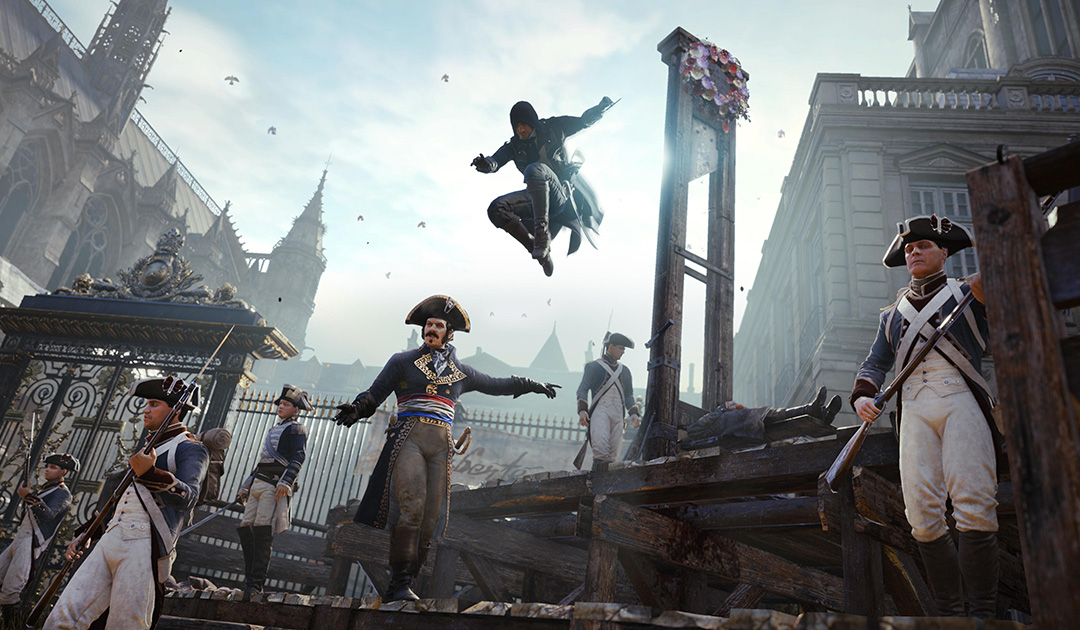
Origins accomplished quite a bit for the franchise and has quickly turned into one of the most beloved installments. This chapter appeared to be created with purpose and well-rounded consideration of the future of the franchise. They addressed the past, but it almost felt like a reboot—shaking the shackles of its history and is now free to rewrite the future without patching it together. Egypt has been a long desired location by fans and thankfully Ubisoft put in the work and nailed it. It was a really good game—beautiful, interesting, fun, and the mythology was superb.
Origins should give Assassin’s Creed a lot of milage going forward. It re-interested longtime fans like myself, but also created an endless path of possibilities to the ancient world filled with a mysterious history that plays right into the AC wheelhouse. Even though Egypt may be the origins of the modern Assassins fight, no doubt the true story is an ancient one and I’m beside myself in anticipation of the next release that will be tackling ancient Greece, entitled Odyssey.
My novel revolves around Greek, Egyptian, and Sumerian mythology—naturally, I’m a sucker for everything going on in Origins and Odyssey. As a writer, I absolutely love the research and care the developers took by accurately representing the history and mythology in Origins. The writers tastefully blended truth with their own new story, which is the same thing I strived to accomplish in The Final Book.
Even though I’m over 80 hours into Origins just to complete the main story, I plan on now purchasing the Season Pass to continue the adventure. Not wanting this game to end is truly saying something, especially after the last few major disappointments.
